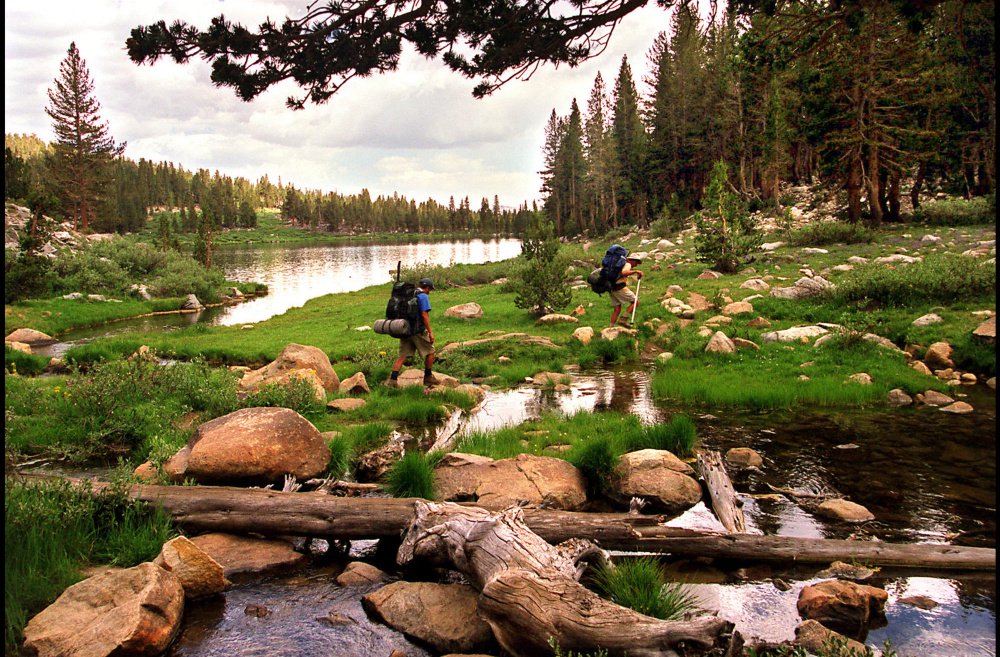Are you sick of going to bed late and waking up tired? Then grab your hiking boots and a tent. A new study suggests that a couple days of camping in the great outdoors can reset your circadian clock and help you get more sleep.
The circadian clock is an internal clock that tells your body when it’s time to go to sleep and when it’s time to wake up. Scientists track this clock by measuring the amount of melatonin circulating in a person’s blood at any given time.
In a healthy sleeper, melatonin levels rise a few hours before bedtime, stay high through the night, and then settle back down to daytime levels when it’s time to wake up. The span of time when melatonin levels are elevated is known as biological night.
In our modern society biological night does not usually coincide with night in the natural world. Most of us stay up many hours past sunset and would probably sleep in many hours after sunrise if we could.
The trouble is, if your biological night begins at midnight or later, your melatonin levels may still be high when your alarm clock goes off in the morning. This leads to grogginess, but it may have other health consequences as well, researchers say. Diabetes, obesity and heart disease have all been associated with people not getting enough sleep.
Previous research by integrative physiology professor Kenneth Wright of the University of Colorado at Boulder found that people can reset their circadian clocks by taking a six-day summer camping trip in the Rocky Mountains.
That study, published in 2013, showed that by the end of the trip, the camper’s bodies started to release melatonin around sunset, and stopped releasing it around sunrise — an average of two hours earlier than when they were tested at home.
Additionally, during the camping trip, the study participants didn’t get up for an entire hour after their bodies stopped releasing melatonin, making it easier for them to wake up in the morning.
“That original study answered a lot of questions, but it raised more questions,” Wright said.
In the new work, published Thursday in Current Biology, Wright’s team set out to determine if our circadian clocks can be reset by a shorter jaunt in nature, and if these biological clocks respond to seasonal influences.
To answer the first question, the researchers recruited 14 physically active volunteers in their 20s and 30s. Nine went on a weekend camping trip, while the other five stayed home. At the end of the weekend, the authors monitored the volunteers’ melatonin levels to see if there had been any shift in the timing of their biological night.
The researchers report that in just two days, the campers’ circadian clocks shifted so that their melatonin levels began to rise more than an hour earlier then they did in the days before they left on the trip. Overall, the difference was equivalent to 69 percent of the effect that the researchers observed when campers went on a six-day trip in 2013.
“This tells us we can reset our clocks fast,” Wright said.
The authors also found that the circadian clocks of the group that stayed home shifted even later over the course of the weekend.
“Those people stayed up later and slept in more, like lots of us do on the weekend and that pushed their clocks later too,” he said.
In another experiment, the authors sent five brave volunteers on a six-day winter camping trip to determine whether the human circadian clock is affected by seasonal changes in day length. When the campers returned home, the authors found that the winter camping group’s biological night was longer than that of the group that went camping for a week in the summer back in 2013.
Send questions/comments to the editors.



Success. Please wait for the page to reload. If the page does not reload within 5 seconds, please refresh the page.
Enter your email and password to access comments.
Hi, to comment on stories you must . This profile is in addition to your subscription and website login.
Already have a commenting profile? .
Invalid username/password.
Please check your email to confirm and complete your registration.
Only subscribers are eligible to post comments. Please subscribe or login first for digital access. Here’s why.
Use the form below to reset your password. When you've submitted your account email, we will send an email with a reset code.